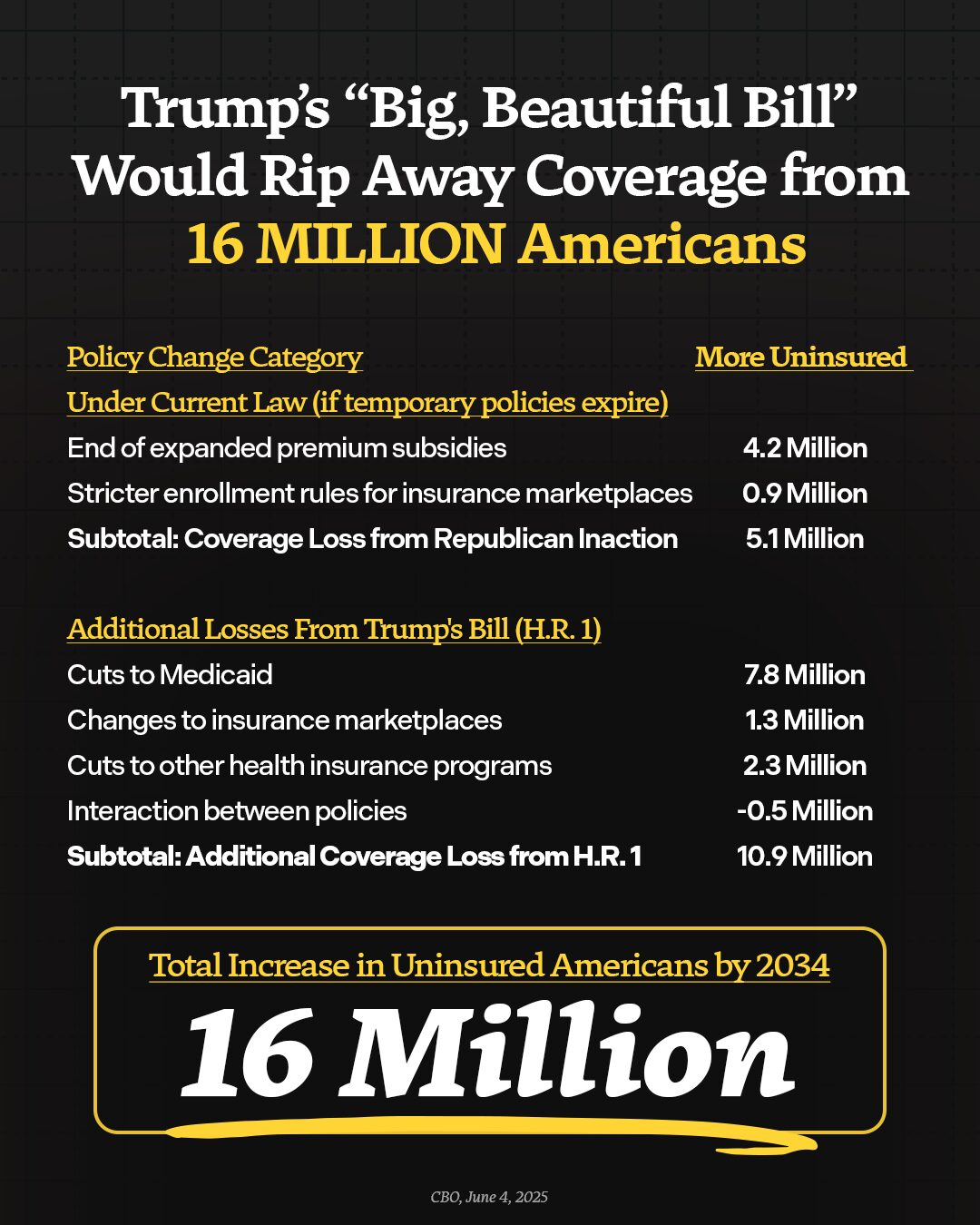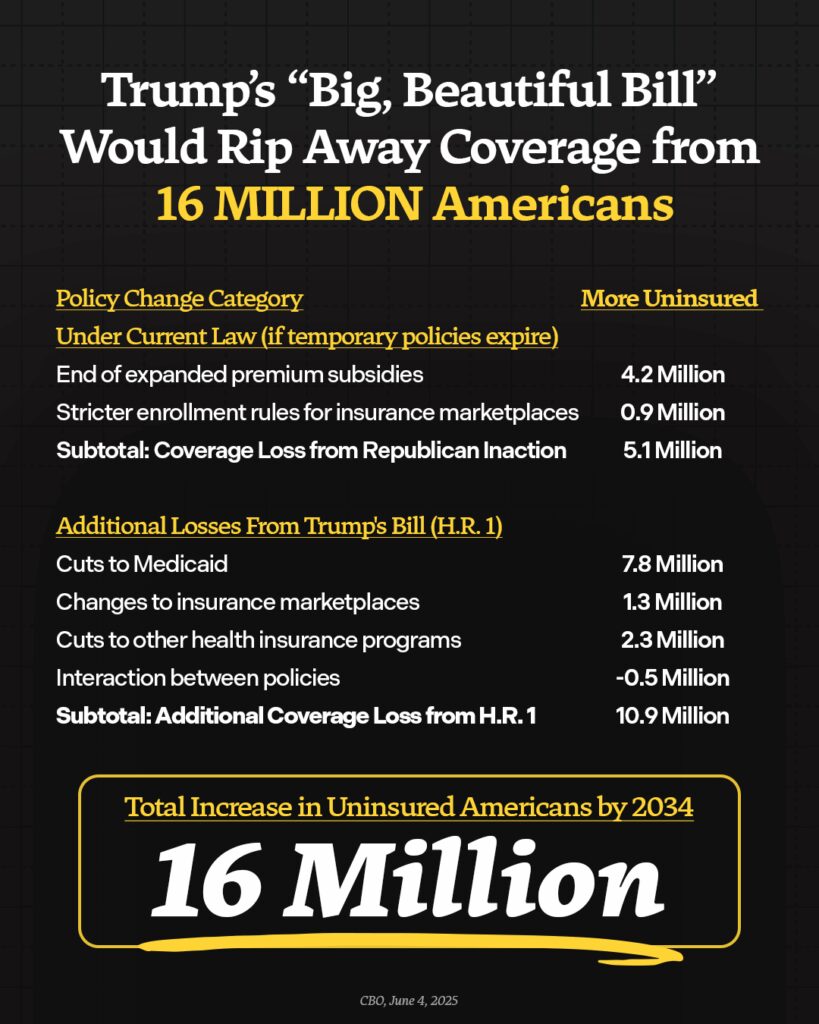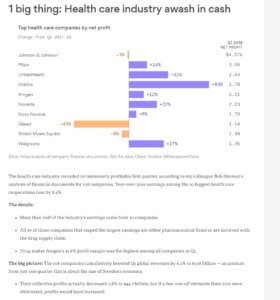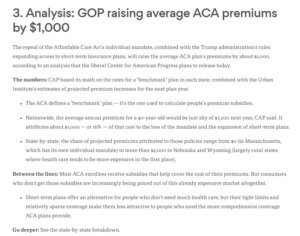
The Republican Big, Terrible Bill Is Getting Worse By the Day
Republicans have supercharged their plan to kick millions of working families off health care in order to hand out tax breaks to billionaires and big corporations. Thanks to their last-minute changes, an additional 2 million Americans will lose their health coverage in order to pay for a bill that now gives even more massive tax breaks to the ultra-wealthy and large corporations and adds trillions to the federal deficit on the backs of hard-working families. The Congressional Budget Office is now estimating that the Republicans will cut over $1 trillion from Medicaid and the Affordable Care Act (ACA), which would throw 16 million Americans off their coverage, and increase the uninsured rate by 50 percent. Trump’s big, ugly bill encompasses the largest cuts to Medicaid and the ACA in history; the GOP plan will destroy our health care system and cause devastation to millions of Americans. This level of estimated coverage loss hasn’t been seen since the 2017 ACA repeal effort, and it threatens the livelihoods of seniors, children, people with disabilities, cancer patients, small business owners, and more. It’s time for Republicans in the Senate to prove where they stand: with billionaires or with everyday Americans.
BY THE NUMBERS
The Republican reconciliation package:
- Rips health care away from 16 million Americans, including seniors, children, veterans, and people with disabilities, to pay for tax breaks for billionaires like Elon Musk and large corporations.
- Cuts over $1 trillion from Medicaid and the ACA to pay for handouts to the wealthiest Americans.
- Hikes premiums for over 24 million Americans, including rural Americans, small business owners, and middle-class families.
- Guts over $150 billion in critical funding for hospitals, which will shutter facilities, forcing more Americans to travel further for maternity care and emergency rooms, and face longer wait times.
- Generates over $600 billion in funding for tax breaks for the rich by making it harder than ever for working families to get the health care they need.
- Demands $8.2 billion in new health care payments from families who are already struggling.
- Contains a $5 billion giveaway to drug companies that will drive up the cost of prescription drugs for seniors and taxpayers.

The Policies Underlying The Biggest Loss of Health Care in American History: The following policies underlie the biggest loss of health care in American history and will kick millions off their coverage, drive premiums through the roof, increase costs for families struggling to get by, raise drug prices for seniors, and make it harder for families to get covered and stay covered.
- Executes The Largest Cuts To Medicaid In History. Republicans are taking away Medicaid so they can give away tax breaks to billionaires, regardless of what they call it. Whether they do it through devastating cuts to federal funding or the addition of burdensome bureaucratic reporting measures known as work requirements, they will have the same result: taking away Medicaid from people who are counting on it.
- Includes billions in cuts to Medicaid Expansion funding to over a dozen states. Republicans are punishing states with cuts to funding for Medicaid expansion. In doing so, Republicans are putting the health care of nearly 12 million Americans across 14 states at risk in the crosshairs of the Republican war on immigrants, including children. States like Illinois stand to lose the most from this policy, where nearly 1 million Illinoisans rely on Medicaid expansion for health care, and the state is required to repeal the program altogether without full federal funding. The reduction in Medicaid expansion funding may also force over 60 rural hospitals across the states affected to close, including in Minnesota, Vermont, Colorado, Utah, Washington, Oregon, New Jersey, New Hampshire, Massachusetts, Connecticut, Rhode Island, Maine, California, and New York.
- Takes away critical financial incentives for states to expand Medicaid, leaving millions of low-income families across the country with nowhere to turn for health care. 10 states have yet to fully expand Medicaid: Georgia, Wisconsin, Texas, Florida, Tennessee, Wyoming, Kansas, Alabama, Mississippi, and South Carolina. Yet, at a time when people are struggling to afford the cost of living and facing economic uncertainty, Republicans are ripping away the possibility of health coverage from millions in these states. States without Medicaid expansion require that some families earn as little as $4,130 a year in order to qualify for Medicaid.
- Limits the ways states fund Medicaid, including provider taxes and state directed payments, which will shutter struggling hospitals and make it nearly impossible for states to manage the burden of the largest cuts to Medicaid in history without kicking millions off their coverage and taking away benefits.
- Hikes Premiums For Over 24 Million Americans. Republicans are ending tax credits for working families, raising costs, and ripping away health care from millions of Americans. If Republicans take away these tax credits, they’ll be taking away health care. Costs will skyrocket by an average of $2,400 for millions of families, and 5 million people will lose their health care altogether. Republicans are going to raise costs on middle-class families while they hand out tax breaks to the very rich and biggest corporations. Families will pay up to 90 percent more for their health care, while billionaires and CEOs will get another huge tax break.
- Adds Wasteful Paperwork Requirements Designed To Throw Millions of Eligible Americans Off Their Health Care To Pay For Tax Breaks For The Wealthy And Corporations. Work requirements are nothing more than purposely burdensome paperwork designed to kick nearly 5 million people off the rolls to pay for tax breaks for the wealthy and corporations. Taking away Medicaid doesn’t help people find jobs. In fact, Medicaid helps people stay employed, and making unemployed people sicker makes it more difficult for them to find work, especially in this tough economy. A government bureaucrat shouldn’t get to decide if someone is “too able-bodied” for health care. People with conditions like severe pain, fatigue, or mental illness may not qualify as “disabled enough” to be exempted from work requirements. Work reporting requirements have been a colossal waste of money in every state that has implemented them and have been shown to increase paperwork but not job growth.
- Increases Health Care Costs For Families Struggling To Get By. Republicans are raising health care costs by demanding $8 billion in new copayments from millions of hardworking families who rely on ACA Medicaid expansion, families who likely already struggle to make ends meet. In addition, the GOP proposal includes a formula change that would increase premiums by an additional $313 a year for the typical family purchasing insurance on their own. It would also allow insurance companies to impose an additional $900 in deductibles and other cost-sharing on families with any private health insurance, including people with employer-based insurance. The proposal also removes regulations requiring private insurers to offer high-quality coverage by allowing them to cover as little as 66% of costs while retaining “Silver” plan status. With this bill, Republicans will increase out-of-pocket costs for middle- and low-income families, while making it easier for insurance companies to rip off Americans.
- Drives Up Prescription Drug Costs And Pads Big Pharma’s Profits. Republicans are slipping a huge giveaway to Big Pharma into a reconciliation package already loaded with tax breaks for CEOs and greedy corporations like drug companies, meaning Big Pharma’s multimillion-dollar investments at Mar-a-Lago are paying off big time. Their scheme to exempt drugs that treat rare diseases from negotiation creates a major loophole for drug companies to exploit to continue padding their profits and price-gouging the seniors who rely on these drugs.
- Makes It Harder For Families To Get Covered And Stay Covered. Republicans are codifying key parts of the 2025 Marketplace Sabotage rule proposed by CMS in March into law. This rule is estimated to kick 2 million people off their Marketplace coverage, increase premiums for millions of people, and make enrolling in a plan more difficult. These changes will make it harder for families to enroll in ACA plans by shortening the enrollment period and taking away low-income families’ ability to sign up for coverage outside of the six-week enrollment period. These policies establish more paperwork burdens for enrolling and proving eligibility for tax credits and targets vulnerable communities that have historically faced barriers to accessing health care.


